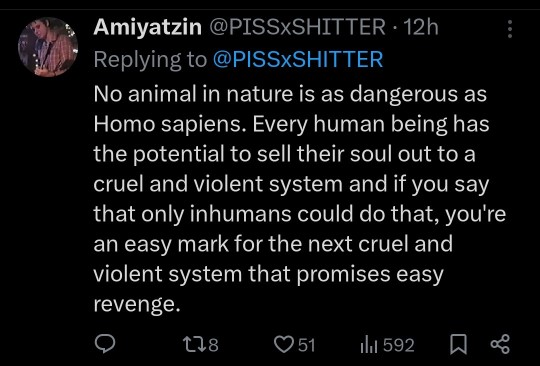they/heBecause fanart reblogs might not go well together with this.
Don't wanna be here? Send us removal request.
Text
Hannah Arendt's banality of evil comes to mind.


68K notes
·
View notes
Text
Even Toni Morrison, winner of a Nobel Prize for literature, dislikes her own writing sometimes. It's fascinating.
I just finished reading The Bluest Eye, her debut novel, which I found absolutely fantastic. It is the first book I read by her (although I have read her 'Recitatif' (a short story) before). I adore 'disjointed' writing — the experience of finding the patterns in something that appears as chaos is thrilling. This book is full of it. Synaesthesia and metonymy are scattered all throughout. It massages every single part of your brain as you read it. Many narrators, at first hard to identify, create a sense of a living community that houses the horrible events that transpire in the story, just as in real life. People whisper about it. As she explains herself in her fore- and afterword to my edition (Vintage Books, 2016), the very first clause in the book — '[q]uiet as it's kept' — sets in motion this frame of people's fragmented and limited views on the events that happen in their worlds.
In that same fore- and afterword, she calls the writing 'not up to [her] current standards.' I was baffled. Here I was, drooling over this book, before being told that it wasn't good enough. I fully believe that the acme of Toni Morrison's writing was long after this work, but it felt astonishing having this book put into relief in such a negative way.
And later that day I looked at something I wrote myself and felt way more comfortable looking at it. It was just a single paragraph which I had abandoned after 'not feeling' it. When I looked at it again, I felt the tension I was trying to convey in it and I even appreciated it. Toni Morrison made my day in two ways without even realising it.
--
NB: For some reason, my edition has a foreword and afterword that are the same text but with paragraph added and/or removed. The editor in me is screaming. Why not just make it one long afterword? I keep running into weird editing choices when reading books.
#writing#writers on tumblr#impostor syndrome#toni morrison#the bluest eye#novel#literature#lit#book review#review
3 notes
·
View notes
Text
It almost sounds ironic now when you read Hannah Arendt's (a Jew, mind you) claim that 'the restoration of human rights, as the recent example of the State of Israel proves, has been achieved so far only through the restoration or the establishment of national rights' (Hannah Arendt, The Origins of Totalitarianism (London: Penguin Books, 2017), 392).
This was in 1951. Nazi Germany was rising to power when she had to flee her country 18 years before that to avoid being made 'stateless,' having 'the prolongation of [her life be] due to charity,' and subsequently still being murdered as so many people were (382, 387). She was alarmed at how the stateless's 'treatment by others does not depend on what he does or does not do' — the stateless is indefensible by nature, due to his heritage only (388).
This is depressing.
#israel#free gaza#gaza#palestine#the irony#some parts of this work are strangely resonant today#some absolutely aren't.#chapter 9 is a very good one!! is still relevant to how minorities and refugees are treated today#chapter 7 is kind of meh#so I think just read chapter 9#her distinction between colonialism and imperialism is largely useless. and she spends a LOT of time on that.#at least her sketches of historical situations are usually very illustrative
0 notes
